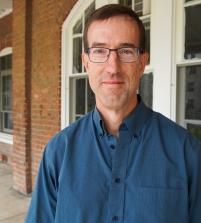Box Cutters and Higher Education -- Brian Britt
Of the many images associated with the year now past, the one that haunts me most is the box cutter
Of the many images associated with the year now past, the one that haunts me most is the box cutter. It is such a familiar object, one that I associate with the pleasure of unpacking books. The scenes of collision, fire, and rubble are so extreme that they seem distant by comparison. But the box cutter is everywhere: in supermarket aisles, offices, and household mail baskets.
The box cutter, it seems, signals a greater threat than chemical or nuclear weapons. Current security thinking has no reliable defense against it. Rules against pocket knives and even nail clippers offer temporary reassurance at best. What procedures must we put in place to protect against the threat posed to our national security by everyday objects?
Forty-four years ago, the launching of Sputnik placed science and math education on the national agenda, and these areas continue to shape discussions of security. But missile shields and nuclear arsenals are useless against box cutters. This challenge requires not new technologies, but better ways of thinking.
I have heard voices in the media, my classrooms, and social circles articulating a tremendous need for knowledge. Educators talk about such occasions as teachable moments. But without an educational context, this desire frequently leads down paths littered with centuries of misunderstanding: xenophobia, superstition, and the confusion of simple facts for genuine insight. Therefore, I call for a national educational agenda for the humanities and social sciences, especially at the university level.
Such a proposal may seem ludicrous, even to many of my colleagues. For years we have listened to attacks on "cultural elites" and "tenured radicals," terms that foreclose debate by capitalizing on an American hatred of snobbery. Some scholars take refuge in narrow areas of expertise or the kind of jargon mocked as fashionable nonsense. Many more, however, continue to work seriously, asking relevant questions and seeking frameworks and evidence to answer them.
Teaching about history and culture can overcome the profound misunderstandings displayed recently by politicians, journalists, and the general public. It takes just one week in an undergraduate course to clear up the confusion of ethnicity with Islam or extremism with tradition. It takes about a semester to distinguish the perspective of privilege from the privilege of perspective. Effective officials and citizens must first be students of traditions, so that they can recognize and analyze contemporary claims, actions, and conflicts. The educational process changes the questions as well as the answers; students should not ask simply "What is jihad?" but "What are some different Islamic understandings of jihad in historical and political context?" It is important to know how texts relate to contexts, how leaders define boundaries, and how current polemics live beyond their roots in the past. Questions of history, globalization, culture, symbols, power, psychology, and identity--the main issues in humanities and social science research today--lie at the heart of today's international crisis.
People have been asking me how I respond to September eleventh as a scholar of religion. At first I couldn't say. I was overwhelmed responding simply as a person. Subsequent reflections have led me to cherish the institution of the university more than ever. My response is that I can think of no task more urgent than teaching and research in the humanities and social sciences.
-- Brian Britt is an Associate Professor of Religion at Virginia Tech, and Director of the Religious Studies Program.


